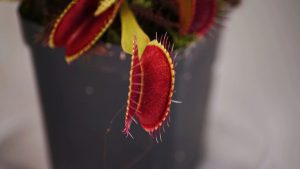
Researchers in Singapore have discovered a way to control a Venus flytrap making use of electric signals from a smartphone, an innovation they hope may be used in a wide range of sectors including robotics, environmental functions and so on.
Luo Yifei, a researcher at Singapore Nanyang Technological University (NTU) demonstrated how a signal from a smartphone app sent to little electrodes attached to the plant could shut its trap close as it does when catching a fly.
‘Plants are like humans. They generate electric signals, like the ECG (electrocardiogram) from our hearts, said Luo, a worker at NTU’s School of Materials Science and Engineering.
‘We developed a non-invasive technology to detect these electric signals from the surface of plants without damaging them,’ Luo said.
The scientists also removed the trap portion of the Venus flytrap and attached it to a robotic arm so it can grip something thin when given an instruction to.
In this way, the plant could be used as a ‘soft robot’, which is basically to pick up delicate things which may be damaged by industrial grippers. It is also more environmentally friendly.
The NTU research team hopes their technology could be used to identify signals from plants about potential diseases or otherwise before the main symptoms appear.
‘We are exploring using plants as living sensors to monitor environmental pollution like gas, toxic gas, or water pollution,’ said Luo. He also stressed that this technology still requires a lot of work before it could be used commercially.
Darren Ng, an enthusiast of carnivorous plants and founder of SG VenusFlytrap, a group which sells the plants and gives care tips, welcomes the research wholeheartedly.
‘If the plant can talk back to us, maybe growing all these plants may be even easier,’ he says.
By Marvellous Iwendi.
Source: Reuters